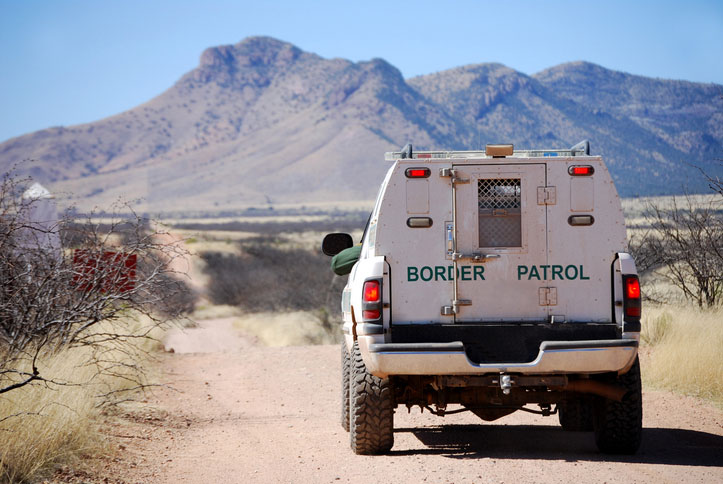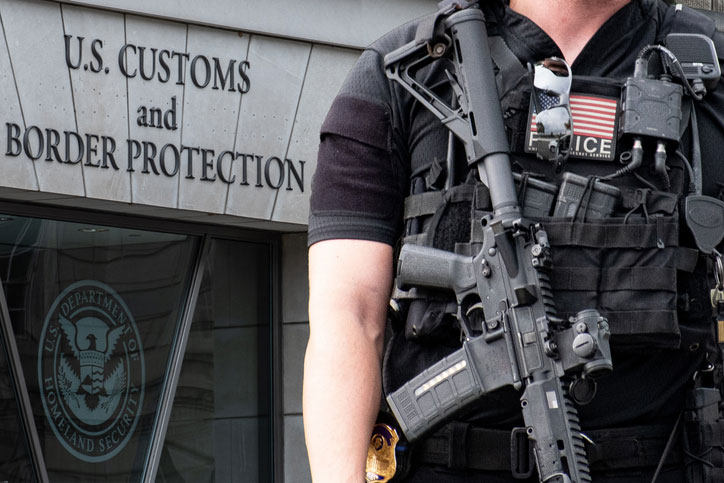The call has been crystal clear: Day One of the second Trump administration is the beginning of what the president calls “the largest deportation program in American history.”
That’s a surge of effort aimed at forcibly removing the estimated 11 million illegal immigrants living in the United States today. It presents a huge challenge to the lead agencies involved: Immigrations and Customs Enforcement (ICE) and the United States Customs and Border Patrol (CBP), both part of the Department of Homeland Security (DHS).
As those organizations gear up for the project, they may just have to go on the largest agency-level hiring sprees in American history too. And at the same time all those new recruits are filling out the ranks, leadership will be enacting a permanent shift in the entire process of border security and enforcement for a generation or more. That means these agencies are calling for recruits with ambition, determination, and, most importantly, the right education.
Generational Changes at ICE and CBP Call for New Visions and New Leadership
The current project may just be the tip of the iceberg.
That’s because an executive order (EO) signed by President Trump on January 20, 2025 revokes birthright citizenship from the children of undocumented immigrants. Although the order claims to exempt individuals born within 30 days after the EO, the reality is that if birthright citizenship under the 14th Amendment is found to be invalid, then it could be determined that it was never actually constitutional in the first place. That puts an estimated 1.3 million more names on a list of individuals to be removed.
Taken together, it’s all an unprecedented effort that will take unmatched logistical support. It’s an effort that would have to include massive construction projects for temporary detention centers to hold around seven times the current total population of the American prison system. Systems to track, organize, and process millions of detainees would have to be built out. And tens of thousands of new Border Patrol agents would have to be hired to execute the project.
As is obvious from the scale involved, it’s not going to be enough to stuff warm bodies in uniforms. The kind of innovation, attention to detail, legal, and organizational skill needed is going to take graduates with a college education to get the job done.
The Border Patrol Faces Serious Staffing Challenges Even With Full Presidential Support

Taken at face value, President Trump’s campaign promises clear the way for the hiring of thousands of new border patrol agents. In November of 2024, on the campaign trail, he called for the addition of 10,000 agents to the ranks of the Border Patrol.
Unfortunately, prospective Border Patrol officers have heard that story before… in 2017, just after taking office the first time, Trump ordered up an additional 5,000 agents. But after signing a $300 million recruiting contract with an outside company that promised to fill those slots, the agency’s headcount actually dropped by more than 1,000 officers. The contract ended up with only 36 new hires at a cost of around $60 million, or more than $1.6 million apiece. You can be sure it didn’t come through as a hiring bonus.
While presidential rhetoric and national sentiment are one thing, immigration enforcement and border security have to remain grounded in longstanding principles and hiring standards for federal law enforcement professionals.
Border patrol positions are not open to cowboys with a cavalier approach to safety or tactics.
In fact, the Border Patrol is among the most selective of federal law enforcement agencies. Only around two percent of applicants actually complete training and make it to active duty, a rate that is similar to the Secret Service. Even the FBI accepts more candidates.
Part of this is a matter of incentives, and Trump has promised agents a ten percent raise and a $10,000 signing bonus. The base salary of between $48,809 and $87,838 would surely be more attractive when that ten percent bump kicks in.
But much of the issue remains a shortage of qualified applicants. While former police and military have an edge in training and core competencies, even they generally are short of the specific skills needed to secure the border.
Significant Challenges Will Require Intense Training To Meet Deportation Goals
The need for new and highly qualified recruits is absolutely vital to the success of the what would be the largest law-enforcement operation in history, though. Even a quick look at the challenges is daunting:
- Identifying, tracing, and apprehending illegal immigrants in all 50 states
- Building evidence and prosecuting removal procedures
- Building, supplying, securing, and operating detention centers to hold millions en route to removal
- Transporting deportees to their country of origin
Arresting all 13 million potential deportees will require ICE to become the largest law enforcement agency in federal government, and possibly in the world.
Adding to the challenge, some of the private industry contractors that CBP and ICE might typically rely on to help support these efforts, such as in transportation, construction, or food provisioning, are suspected to be heavily staffed by immigrant labor. So even as the agencies ramp up to deport immigrants, their support systems will be undermined by those very removals.
The kind of planning required to execute such a program—particularly considering no extra budget appropriations have yet been provided—will take miracle workers.
A College Education Will Be In High Demand Among Border Patrol Recruits
This is where education comes in.
CBP already prefers applicants who have at least an associate or bachelor’s degree. It might surprise you to learn that there is no field specified for those degrees. You can qualify—and get a salary and grade level bump—with a bachelor’s in any field just as easily as with a homeland security degree.
That’s because the essential elements of an American college education come as much through standard liberal arts courses as through any subject-specific training. As you earn a college degree, what you are really learning are critical-thinking skills, problem-solving abilities, how to communicate, how to understand and apply new ideas.

Those are all key abilities for agents who have to think on their feet, regularly deal with new cultures, and quickly develop new techniques to keep up with an ever-shifting environment on the border.
With courts expected to challenge many arrests, border patrol officers will have to be diligent in dotting every i and crossing every t on each deportation they initiate.
Of course, a degree in criminal justice or homeland security will also give you a deeper understanding of some of the most critical parts of the job. A better understanding of the legal aspects of immigration enforcement, a deeper view into the threats to homeland security at the border, and a broader view of the criminal justice system and international order will all make you better and more effective at your job.
The Right Degree Also Unlocks Advancement and Higher Paying Positions
While a degree can help you land a job as an agent, it also opens the door to more advanced—and more highly paid—positions with CBP or ICE.
In the modern world, both agencies have a strong need for technical experts in international affairs, finance, information technology, and administration. Highly specialized enforcement roles also routinely require college degrees, even advanced ones like master’s degrees:
- Intelligence Operations Specialist
- Materials Handler
- Air Interdiction Agent
- Supervisory Data Scientist
- Supervisory Management and Program Analyst
Naturally, management and supervisor jobs in any part of the agency typically go to people with the best qualifications, including college degrees. The ability to organize, communicate clearly, and understand and motivate staff are all skills that come out of a college degree.
Meeting Deportation Objectives Will Rest on the Shoulders of CBP Officers and Border Patrol Agents Who Understand the Law and the World
Those organizational skills may very well be key to a smooth future for mass detentions and deportations.
Every veteran Border Patrol agent understands that the hard part isn’t finding or even detaining illegal immigrants. The challenge is in processing, handling, and ultimately shipping them back to their country of origin.
Unsurprisingly, this is all a challenge that can’t be brute-forced. Countries can decide whether or not to accept deportation flights; Mexico and Colombia have already rejected some early in the second Trump administration, and countries like Brazil have suggested that their willingness to accept deportees may hinge on how ICE manages those flights.
So, again, college-educated ICE and CBP professionals will be key to managing these efforts to ensure they run like clockwork. Fortunately, there are many excellent programs available at colleges and universities around the country where you can get exactly the specialized education you need to become a leader in homeland security and immigration enforcement.





